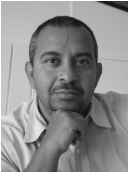- FAMA
- Researchers
-
Projects
- MESPI
- Knowledge Production Project >
-
Political Economy Project
>
- Development and the Uprisings
- Class Formations and Dynamics
- The Palestinian Economy: Fragmentation and Colonization
- Tunisia: A Political Economy in Transition
- Migrant States, Mobile Economies: Rethinking the Political in Contemporary Turkey
- Political Economy of the Middle East: Continuities & Discontinuities in Teaching & Research
- 2016 Political Economy Institute
- The Lebanon Project >
- The Palestine Project >
- The Civil Society Project >
- Middle East Media Project >
- The Egypt Project >
- Refugees and Migrants Project >
- Black-Palestinian Transnational Solidarities Project
- Initiatives
- Events
- Summer Institutes
- Internships
- Blog
RESEARCHERS
|
Sherene Seikaly is Associate Professor of History at the University of California, Santa Barbara. She received her PhD in History and Middle Eastern and Islamic Studies at New York University and a Masters in Arab Studies from Georgetown University. She held the Qatar Postdoctoral Fellowship at Georgetown University and the Europe in the Middle East Postdoctoral Fellowship at the Wissenschaftskolleg zu Berlin. Seikaly was Director of the Middle East Studies Center at the American University in Cairo (2012-2014), where she was awarded an Excellence in Teaching Award in 2014. Seikaly is the editor of the Arab Studies Journal, co-founder and co-editor of Jadaliyya e-zine, an editor of Journal of Palestine Studies, a policy member of Al-Shabaka, the Palestinian Policy Network, a board member of the Palestinian American Research Center, and a member of the Middle East Studies Association Board. Seikaly's Men of Capital: Scarcity and Economy in Mandate Palestine (Stanford University Press, 2016) explores how Palestinian capitalists and British colonial officials used economy to shape territory, nationalism, the home, and the body. It received the Middle East Political Economy Book Prize. Her forthcoming book titled From Baltimore to Beirut: On the Question of Palestine focuses on a Palestinian man who was at once a colonial officer and a colonized subject, an enslaver and a refugee. His trajectory from nineteenth century mobility across Baltimore and Sudan to twentieth century immobility in Lebanon places the question of Palestine in a global history of race, capital, slavery, and dispossession. Seikaly has published in academic journals such as International Journal of Middle East Studies and Journal of Middle East Women’s Studies as well as in online venues including Jadaliyya, Mada Masr, and 7iber. |
|
Bassam Haddad is Director of the Middle East Studies Program and Associate Professor in the Department of Public and International Affairs at George Mason University, and is Visiting Professor at Georgetown University. He is the author of Business Networks in Syria: The Political Economy of Authoritarian Resilience (Stanford University Press, 2011). Bassam is currently editing a volume on Teaching the Middle East After the Arab Uprisings, a book manuscript on pedagogical and theoretical approaches. His most recent books include two co-edited volumes: Dawn of the Arab Uprisings: End of an Old Order? (Pluto Press, 2012) and Mediating the Arab Uprisings (Tadween Publishing, 2013). Bassam serves as Founding Editor of the Arab Studies Journal a peer-reviewed research publication and is co-producer/director of the award-winning documentary film, About Baghdad, and director of the critically acclaimed film series, Arabs and Terrorism, based on extensive field research/interviews. More recently, he directed a film on Arab/Muslim immigrants in Europe, titled The "Other" Threat. Bassam is Co-Founder/Editor of Jadaliyya Ezine and serves on the Editorial Committee of Middle East Report. He is the Executive Director of the Arab Studies Institute, an umbrella for five organizations dealing with knowledge production on the Middle East and Founding Editor of Tadween Publishing.
|
|
Sinan Antoon is a poet, novelist, scholar, and translator. He has published two collections of poetry; Mawshur Muballal bil-Hurub (Cairo, 2003) and Laylun Wahidun fi Kull al-Mudun (One Night in All Cities) (Beirut/Baghdad: Dar al-Jamal, 2010). His novels include I`jaam (2003), translated into English as I`jaam: An Iraqi Rhapsody (City Lights, 2006) as well as Norwegian, German, Portuguese, and Italian, Wahdaha Shajarat al-Rumman (The Pomegranate Alone) (2010) was translated by the author and as The Corpse Washer and was longlisted for the Independent Prize for Foreign Fiction. It won the 2014 Saif Ghobash Banipal Prize for Literary Translation. His third novel, Ya Maryam (2012) was shortlisted for the International Prize for Arabic Fiction and was translated to Spanish by Maria Luz Comendador (Turner Libros, 2014) under the title Fragments de Bagdad and is forthcoming in English as The Baghdad Eucharist (AUC Press, 2017). His translation of Mahmoud Darwish’s last prose book In the Presence of Absence won the 2012National Translation Award given by the American Literary Translators Association (ALTA).
His academic works include articles on Mahmoud Darwish and Sargon Boulus and a book based on his doctoral dissertation; The Poetics of the Obscene: Ibn al-Hajjaj and Sukhf (PalgraveMacmillan, 2013). He is an associate professor at the Gallatin School, New York University and co-founder of Jadaliyya and co-editor of its culture page. |
|
Nadya Sbaiti is Assistant Professor of Middle East Studies at the American University of Beirut (AUB). She earned her MA in Arab Studies and her PhD in History from Georgetown University and specializes in the social and cultural histories of the modern Middle East. She is currently working on a book manuscript entitled “Pedagogical Constituencies and Communities of Knowledge in Mandate Lebanon,” which examines the central role of education to the formation of multiple national narratives and the production of history. Her recent publications include “ A Massacre Without Precedent’” (2015); “‘If the Devil Spoke French’” (2010) as well as articles that guide researchers through Lebanon’s postwar archival terrain. Additional research interests include spatial manifestations of colonial and national projects; colonial methods of social control through prisons and asylums; the production of history as both discursive and material practice; tourism and heritage; and contemporary popular culture. She has taught introductory surveys of modern Middle Eastern history, courses on women and gender in the Middle East, the history of education, the Middle East and World War I, aspects of colonialism and nationalism, as well as nonwestern urban history. In addition, she is a co-founder and co-editor of Jadaliyya e-zine. |
|
Noura Erakat is a human rights attorney and an Assistant Professor at Rutgers University, New Brunswick Department of Africana Studies. Her research interests include humanitarian law, refugee law, national security law, and critical race theory. Noura is the author of Justice for Some: Law As Politics in the Question of Palestine (Stanford University Press, 2019). She is a Co-Founding Editor of Jadaliyya e-zine and an Editorial Committee member of the Journal of Palestine Studies. She has served as Legal Counsel for a Congressional Subcommittee in the House of Representatives, as a Legal Advocate for the Badil Resource Center for Palestinian Refugee and Residency Rights, and as the national grassroots organizer and legal advocate at the US Campaign to End the Israeli Occupation. Noura is the coeditor of Aborted State? The UN Initiative and New Palestinian Junctures, an anthology related to the 2011and 2012 Palestine bids for statehood at the UN. More recently, Noura released a pedagogical project on the Gaza Strip and Palestine, which includes a short multimedia documentary, "Gaza In Context," that rehabilitates Israel’s wars on Gaza within a settler-colonial framework. She is also the producer of the short video, "Black Palestinian Solidarity." She is a frequent commentator, with recent appearances on CBS News, CNN, Fox News, and NPR, among others, and her writings have been widely published in the national media and academic journals.
|
|
Ziad Abu-Rish is Assistant Professor in the Department of History at Ohio University. His research interests focus on state formation, economic development, and social mobilization in the mid-twentieth-century Levant. Abu-Rish is currently working on a book manuscript entitled "Making the Economy, Producing the State: Conflict and Institution Building in Early Independence Lebanon," which explores the changing nature of state management of the economy and the shifting patterns of alliances and conflicts that sought to shape that management. Abu-Rish earned his PhD from the Department of History at the University of California Los Angeles, and his MA in Arab Studies from the Center for Contemporary Arab Studies at Georgetown University. He serves on the editorial teams of the Arab Studies Journal and Jadaliyya e-zine. He also directs the Arab Studies Institute's Lebanon Project. Abu-Rish's publications include "Garbage Politics" (Middle East Report, Winter 2015) and “Protests, Regime Stability, and State Formation in Jordan,” as well as two co-edited volumes: The Dawn of the Arab Uprisings: End of an Old Order? (Pluto Press, 2012) andCritical Voices On and From the Middle East (Tadween Publishing, 2015). |
|
Maya Mikdashi is an Assistant Professor at the Department of Women’s and Gender Studies at Rutgers University, New Brunswick. She received her PhD in Anthropology from Columbia University. Her current research/manuscript focuses on law, citizenship, secularity, religious conversion, sexual difference, and war in Lebanon. She has been a Mellon Postdoctoral Fellow from 2014-2016 at Rutgers University, and a Faculty Fellow/Director of Graduate Studies, Center for Near Eastern Studies, New York University (2012-2014). She has published widely in journals including the International Journal of Middle East Studies, Comparative Study of South Asia, Africa, and the Middle East, Gay and Lesbian Quarterly, and the American Indian Culture and Research Journal. She is a co-founding editor of Jadaliyya.com, co-director of the feature length documentary About Baghdad (2004) and co- founding member of filmmaking cooperative Quilting Point Productions, and co-writer and performer in Deseos (2016). |
|
Mouin Rabbani is a researcher and analyst specialising in Palestine and the contemporary Middle East, and is Director of Programs at the Arab Studies Institute – Research and Education Methodologies. He has previously served as Principal Political Affairs Officer with the Office of the UN Special Envoy for Syria, Head of Middle East with Crisis Management Initiative/Martti Ahtisaari Centre, Senior Middle East Analyst and Special Advisor on Israel-Palestine with the International Crisis Group, and Project Director with the Association of Netherlands Municipalities. He is Senior Fellow with the Institute for Palestine Studies, Co-Editor of Jadaliyya, Contributing Editor of Middle East Report, and Policy Advisor to Al-Shabaka - The Palestinian Policy Network. A graduate of Tufts University and Georgetown University’s Center for Contemporary Arab Studies, Rabbani has published, presented and commented widely on Middle East issues, including for most major global media. |
|
Hesham Sallam is a Research Scholar at Stanford’s Center on Democracy, Development, and the Rule of Law and serves as the Associate-Director of the Program on Arab Reform and Democracy. He is also a co-editor of Jadaliyya ezine and a former program specialist at the U.S. Institute of Peace. His research focuses on Islamist movements and the politics of economic reform in the Arab World. Sallam’s research has previously received the support of the Social Science Research Council and the U.S. Institute of Peace. Past institutional affiliations include Middle East Institute, Asharq Al-Awsat, and the World Security Institute. He is editor of Egypt's Parliamentary Elections 2011-2012: A Critical Guide to a Changing Political Arena (Tadween Publishing, 2013). Sallam received a Ph.D. in Government (2015) and an M.A. in Arab Studies (2006) from Georgetown University, and a B.A. in Political Science from the University of Pittsburgh (2003). |
|
Rosie Bsheer is a historian of the modern Middle East. Her teaching and research interests center on Arab intellectual and social movements, petro-capitalism and state formation, and the production of historical knowledge and commemorative spaces. She is currently finishing up a book manuscript, provisionally entitled, Archive Wars: The Politics of Statecraft in Saudi Arabia (under contract with Stanford University Press). She has published articles and op-eds in Past and Present, the International Journal of Middle East Studies, The Washington Post, The Nation, NPR, and Moyen-Orient. Bsheer teaches graduate and undergraduate courses on oil and empire, social and intellectual movements, petro-modernity, political economy, historiography, and the making of the modern Middle East. She is Associate Producer of the 2007 Oscar-nominated film My Country, My Country, Co-Editor of Jadaliyya E-zine, and Associate Editor of Tadween Publishing. |
|
Lisa Hajjar is a professor of sociology at the University of California – Santa Barbara. Her work focuses mainly on issues relating to law and conflict, military courts and occupations, human rights and international law, and torture and targeted killing. Her publications include Courting Conflict: The Israeli Military Court System in the West Bank and Gaza (University of California Press, 2005) and Torture: A Sociology of Violence and Human Rights (Routledge 2013). She is currently working on a book titled The War in Court: The Inside Story of the Fight against Torture in the “War on Terror.” In 2014 - 2015, she was the Edward Said Chair of American Studies at the American University of Beirut and served as the director of the Alwaleed Center for American Studies and Research (CASAR) at AUB in 2015 – 2016. Hajjar served for several terms as a member of the editorial committee of Middle East Report, and is one of the founding co-editors of Jadaliyya |
|
Samia Errazzouki is a Morocco-based journalist and researcher. She has been involved with Jadaliyya since 2012 through her work in creating and managingJadaliyya’s Maghreb Page—the only online publication exclusively dedicated to publishing on the Maghreb region in English, French, and Arabic. Samia received her M.A. in Arab Studies from Georgetown University. Since graduating, Samia has been working in Rabat as a field research associate for the University of Cambridge. Additionally, Samia has been working as a journalist with the Associated Press (AP), reporting news on Morocco. In the past, she has published with a number of print and online publications, including the Journal of North African Studies, Foreign Policy, Al Jazeera, the National, Brownbook Magazine, the Guardian, and many more. Her research interests are Maghrebi history and memory, with a focus on the period of state formation. |
|
Tony Alessandrini is a Professor of English at Kingsborough Community College and in the MA Program in Middle Eastern Studies at The Graduate Center of The City University of New York, where he is also a member of the Committee on Globalization and Social Change. He is the author of Frantz Fanon and the Future of Cultural Politics: Finding Something Different; the editor of Frantz Fanon: Critical Perspectives; and the co-editor of "Resistance Everywhere": The Gezi Protests and Dissident Visions of Turkey. He recently published a poetry chapbook entitled Children Imitating Cormorants. He is on the faculty of the Brooklyn Institute for Social Research, and is a co-organizer of the International Solidarity Research Action Network (ISARN). He is a Co-Editor of Jadaliyya E-Zine.
|
|
Omar S. Dahi is Associate Professor of economics at Hampshire College. His research interests are in the areas of political economy, international trade, and economic development. His publications have appeared in academic journals such as Applied Economics, Journal of Development Economics, Southern Economic Journal, and Forced Migration Review. His book South-South Trade and Finance in the 21st Century: Rise of the South or Second Great Divergence (Anthem Press) co-authored with Firat Demir, investigates the implications of increasing trade and financial flows within the global South. He is currently conducting research on the Syrian conflict, the regional refugee crisis and the challenges of post-conflict recovery. Dahi serves as a contributing editor to e-zine Jadaliyya and on the editorial committee of MERIP. |
|
Adam Hanieh s a Senior Lecturer in Development Studies at (SOAS), University of London. He holds a PhD in Political Science from York University in Canada, and an MA in Regional Studies from Al Quds University, Jerusalem. Dr. Hanieh’s major research focus is on the political economy of class and state formation in the GCC, and the implications of these processes for development in the Arab world. He is particularly interested in the way that the regional Arab economy has transformed over recent decades, under the combined impact of neoliberal reform, increasing integration with global capitalism, and the internationalisation of capital structures throughout the region. His recent books include: Capitalism and Class in the Gulf Arab States (Palgrave-Macmillan, 2011), Lineages of Revolt: Issues of Contemporary Capitalism in the Middle East (Haymarket Press, 2013) and (co- edited) Transit States: Labour, Migration and Citizenship in the Gulf (Pluto Press 2014). |
|
Adel Iskandar is an Assistant Professor of Global Communication at Simon Fraser University in Vancouver, Canada. He is the author, co-author, and editor of several works including Egypt In Flux: Essays on an Unfinished Revolution (AUCP/OUP); Al-Jazeera: The Story of the Network that is Rattling Governments and Redefining Modern Journalism (Basic Books); Edward Said: A Legacy of Emancipation and Representation (University of California Press); Mediating the Arab Uprisings (Tadween Publishing); and Media Evolution on the Eve of the Arab Spring (Palgrave Macmillan). Iskandar's work deals with media, identity and politics; and he has lectured extensively on these topics at universities worldwide. His forthcoming publications are two monographs, one addressing the political role of memes and digital satire and the other about contemporary forms of imperial transculturalism. Prior to his arrival at SFU, Iskandar taught at the Center for Contemporary Arab Studies and the Communication, Culture, and Technology Program at Georgetown University, in Washington, DC. Iskandar's engaged participatory research includes supporting knowledge production through scholarly digital publishing as co-editor of Jadaliyya and academic podcasting as associate producer of the audio journal Status. |
|
John Warner is the Research and Development Manager at the Arab Studies Institute. He received his MPhil in cultural anthropology from the City University of New York Graduate Center and his MA in Arab Studies from Georgetown University. He has taught anthropology and Middle East studies at several different institutions, including Queensborough Community College, Hunter College, and New York University. He is currently a co-editor of Jadaliyya’s Arabian Peninsula page and formerly a co-editor of the Findings section of the scholarly journal Anthropology Now. He has also worked as an assistant director and field producer for Quilting Point, a documentary film collective. |
|
Fateh Azzam has worked in the human rights field for 30 years from a variety of perspectives: in the NGO advocacy sector, in human rights philanthropy, in academia and in the United Nations. He was director of the Asfari Institute for Civil Society and Citizenship at the American University of Beirut; MENA Regional Representative of the UN High Commissioner for Human Rights; directed the Forced Migration and Refugee Studies Program at the American University in Cairo; worked for the Ford Foundation’s Offices in Lagos and Cairo and was director of the Palestinian human rights organization Al-Haq. His volunteer activities include leading the process of establishing the Arab Human Rights Fund and the Independent Commission for Human Rights, the Palestinian national human rights institution. Fateh holds an LLM in International Human Rights Law from the University of Essex and has written on civil and political rights in Arab constitutions, Arab states and UN human rights mechanisms, the right to development, Palestinian citizenship, the Responsibility to Protect, and other topics. He published two plays, Ansar (1991) on life in the Israeli detention facility Ketziot, and Baggage (2001), on the struggle between freedom and responsibility in the refugee diaspora. |
- FAMA
- Researchers
-
Projects
- MESPI
- Knowledge Production Project >
-
Political Economy Project
>
- Development and the Uprisings
- Class Formations and Dynamics
- The Palestinian Economy: Fragmentation and Colonization
- Tunisia: A Political Economy in Transition
- Migrant States, Mobile Economies: Rethinking the Political in Contemporary Turkey
- Political Economy of the Middle East: Continuities & Discontinuities in Teaching & Research
- 2016 Political Economy Institute
- The Lebanon Project >
- The Palestine Project >
- The Civil Society Project >
- Middle East Media Project >
- The Egypt Project >
- Refugees and Migrants Project >
- Black-Palestinian Transnational Solidarities Project
- Initiatives
- Events
- Summer Institutes
- Internships
- Blog



















